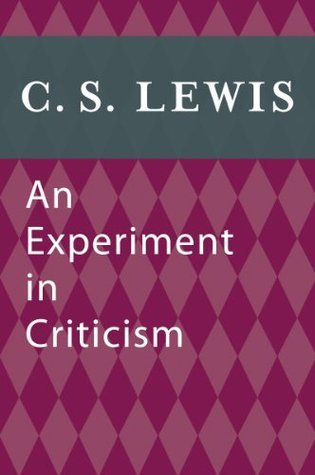What do you think?
Rate this book


Why do we read literature and how do we judge it? C. S. Lewis's classic An Experiment in Criticism springs from the conviction that literature exists for the joy of the reader and that books should be judged by the kind of reading they invite. He argues that "good reading," like moral action or religious experience, involves surrender to the work in hand and a process of entering fully into the opinions of others: "in reading great literature I become a thousand men and yet remain myself." Crucial to his notion of judging literature is a commitment to laying aside expectations and values extraneous to the work, in order to approach it with an open mind. Amid the complex welter of current critical theories, C. S. Lewis's wisdom is valuably down-to-earth, refreshing and stimulating in the questions it raises about the experience of reading.
154 pages, Kindle Edition
First published January 1, 1961
In the course of my inquiry I have rejected the views that literature is to be valued (a) for telling us truths about life, (b) as an aid to culture. I have also said that, while we read, we must treat the reception of the work we are reading as an end in itself.
What then is the good of… occupying our hearts with stories of what never happened and entering vicariously into feelings which we should try to avoid having in our own person?
…we seek an enlargement of our being. We want to be more than ourselves. Each of us by nature sees the whole world from one point of view with a perspective and a selectiveness peculiar to himself. And even when we build disinterested fantasies, they are saturated with, and limited by, our own psychology. … We want to see with other eyes, to imagine with other imaginations, to feel with other hearts, as well as with our own.
But literary people are always looking for leisure and silence in which to read and do so with their whole attention. When they are denied such attentive and undisturbed reading even for a few days they feel impoverished. (2–3)I also enjoyed his critique of readers who assume that the tragic is more deeply realistic than the comic—another tendency that often goes along with higher education and grad school: “It seems to me undeniable, that tragedy, taken as a philosophy of life, is the most obstinate and best camouflaged of all wish-fulfilments, just because its pretensions are so apparently realistic. . . . [M]any young people derive the belief that tragedy is essentially ‘truer to life’ than comedy. This seems to me wholly unfounded. Each of these forms chooses out of real life just those sorts of events it needs. The raw materials are all around us, mixed anyhow. It is selection, isolation, and patterning, not a philosophy, that makes the two sorts of play.” (79–80).
In the good reading of a good book, on the other hand, though they certainly point, words do something for which “pointing” is far too coarse a name. They are exquisitely detailed compulsions on a mind willing and able to be so compelled. (89)